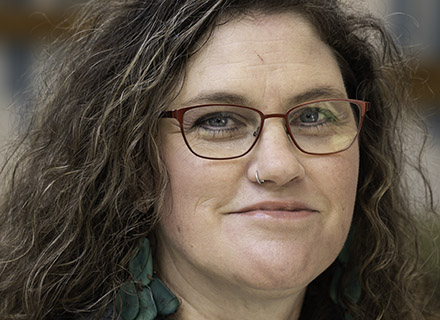Dr. Jill McCracken, USF St. Petersburg Professor of Rhetoric and Gender Studies, was honored with an Influential Scholar Award at the International Human Trafficking & Social Justice Conference in Toledo, Ohio this month.
The award comes in the wake of a series of studies McCracken conducted as Fulbright Specialist in New Zealand and with women serving time in Florida prisons for sex work-related convictions. The Influential Scholar Award is given to individuals whose academic research has made meaningful contributions to the understanding and prevention of human trafficking.
Through her research, McCracken has helped shed light on the challenges faced by sex workers and draws attention to the ways in which the criminal justice system may perpetuate certain illicit activities through the very policies it has in place to prevent them.
“I’m so appreciative of this space, this conference,” McCracken said in her acceptance speech. “We have anti-trafficking organizations and social service providers, law enforcement and lawyers, sex workers and sex worker rights advocates. We can all come together and talk, listen, disagree and try to figure out ways of combating this horrific exploitation and violence while upholding human rights.”

McCracken has researched sex work and trafficking in the sex industry for 15 years. In the early 2000s, McCracken helped launch the Sex Workers Outreach Project (SWOP) USA, an organization that works towards education and advocacy for sex workers. Later, she co-founded SWOP Behind Bars, which works with incarcerated sex workers, as well as victims and people convicted of sex trafficking.
McCracken and her colleagues hope their research will deescalate violence, stigma and discrimination against sex workers, while decreasing the inadvertent harm caused by criminalization and incarceration.
At the conference in Toledo, McCracken gave two presentations on recent research. The first involved the apparent overlap between adult consensual sex work and sex trafficking. “There are a lot of people who are being convicted both of trafficking others and of trafficking themselves [as sex workers],” McCracken said. However, she stressed, “there is big difference between adult consensual sex work and being forced to do this kind of work.”
Through her work at SWOP Behind Bars, McCracken also found that many people convicted of sex trafficking have themselves experienced exploitation in the industry. McCracken worked with women serving time for sex trafficking convictions, who shared stories about being trafficked in the past and described a criminal justice system that can sometimes punish victims.
“When people have a criminal record—even certified trafficking victims—they’re more at risk of being exploited and trafficked, because it’s so difficult for them to find mainstream employment,” McCracken said. “These people feel they are forced to go back into sex work because there’s nothing else they can do.”
In her second presentation, McCracken discussed her research in New Zealand, where sex work has been decriminalized since 2003. While on a Fulbright Specialist Project, McCracken examined how the country’s decriminalized environment impacts trafficking and found that people there are more likely to seek support from law enforcement or community organizations in the case of violence or exploitation.
McCracken acknowledges that sex work is often a contentious issue but thinks we should look to places like New Zealand as an example of why decriminalization may be good policy in the United States. Criminalization of sex work causes unintended consequences, McCracken argues, and inadvertently puts sex workers in more danger.
“As a society we should think about how our policies impact individuals who are engaged in the sex industry,” she said. “Trafficking is a terrible thing and we absolutely have to have laws against it, but some of that legislation is punishing people who are adult consensual sex workers. If we won’t listen to the people who are engaging in this work, then we’re really doing them and us a disservice.”
